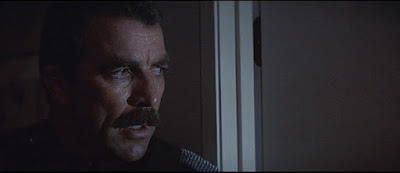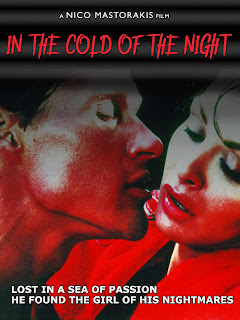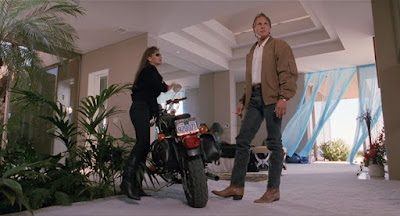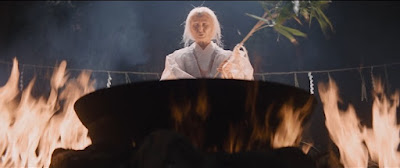I guess you could call this rednecksploitation, or maybe trucksploitation.
Anna (Lieux Dressler) runs a truck stop in New Mexico but she has a few sidelines going, such as a major truck hijacking racket. The muscle for her operation is provided by a bunch of cowboys. They’re fiercely loyal to Anna.
Anna’s truck stop is very popular because when a man has been driving his rig for days he needs a little relaxation. Anna’s girls provide that. They provide a full service.
Anna’s daughter Rose (Claudia Jennings) is running wild a bit and she’s going to cause some trouble.
The real trouble on the way is coming from a bunch of mobsters from out east. They represent a major syndicate. Anna has always kept her distance from the big boys of crime. Her truck hijacking racket and her brothel provide more than enough money to keep her happy. But maybe those big city mobsters are not going to leave her in peace.
She’s never had any problem with the local sheriff. He’s one of the brothel’s favourite customers.
There are actually two outsiders in town trying in different ways to muscle in on Anna’s territory. Smith and Rusty are vicious big city hoodlums and Smith is ambitious. They’re out-and-out bad guys.
Seago is also an out-of-town mobster. He’s on Anna’s side. Up to a point anyway. She does suspect that he may have plans to grab a sizeable chunk of her operation. Seago has a plan. Anna wants nothing to do with it because she has always avoided getting on the wrong side of the major syndicates but maybe she won’t have a choice.
The amusing thing is that the good guys (Anna and her cowboys and her whores) hardly qualify as good guys. Anna is after all running a small-scale organised crime operation. They’re not exactly solid citizens. But we’re immediately on their side because they’re the underdogs, they’re the little guy. And they love country music.
The acting is perfect for this type of movie. Nobody is taking this seriously as drama but they are doing their best to be fun. Lieux Dressler is magnificent. How did she not have a better career?
Claudia Jennings makes a splendid spoilt bad girl. It’s a finely judged subtle performance - she manages to keep us guessing until the end about which way Rose will end up jumping, and she manages to appear treacherous without overdoing it. Call me crazy if you like but based on this performance Claudia Jennings could have given acting lessons to some of the much bigger female stars of the time.
This is one of those movies that promises a bit more sleaze than it delivers but there’s still a healthy quantity of T&A.
And the music is great! This is real truck-driving music.
It’s easy to get smarmy about a movie like this but it’s an extremely well-crafted film. The pacing is perfect. The action scenes are excellent. There’s the right balance between a serious crime story and lighthearted trucking action and humour and titillation.
Trucksploitation was an actual genre and there were even big-studio productions. Truck Stop Women is a better film than any of the big-studio attempts. It delivers more entertainment value. And it makes no apologies for being a drive-in movie. Drive-in audiences liked trucks and they liked tits. This movie offers plenty of both but it also offers huge amounts of enjoyment.
On the audio commentary Kim Newman points out that the basic core plot is lifted straight from Mildred Pierce and he makes the daring suggestion that in some ways Truck Stop Women handles that core plot more effectively. I’m inclined to agree with him.
Truck Stop Women offers fistfights, gunfights, truck chases, boobs, laughs and country music. On one level it’s a lively enjoyable romp. But always lurking in the background is a serious human drama about mothers and daughters. It’s the performances of Claudia Jennings and Lieux Dressler that make this movie more than just a fun exploitation movie. It is a fun exploitation movie but it’s a rather good movie as well. And the ending is superbly done.
Truck Stop Women is highly recommended.
Anna (Lieux Dressler) runs a truck stop in New Mexico but she has a few sidelines going, such as a major truck hijacking racket. The muscle for her operation is provided by a bunch of cowboys. They’re fiercely loyal to Anna.
Anna’s truck stop is very popular because when a man has been driving his rig for days he needs a little relaxation. Anna’s girls provide that. They provide a full service.
Anna’s daughter Rose (Claudia Jennings) is running wild a bit and she’s going to cause some trouble.
The real trouble on the way is coming from a bunch of mobsters from out east. They represent a major syndicate. Anna has always kept her distance from the big boys of crime. Her truck hijacking racket and her brothel provide more than enough money to keep her happy. But maybe those big city mobsters are not going to leave her in peace.
She’s never had any problem with the local sheriff. He’s one of the brothel’s favourite customers.
There are actually two outsiders in town trying in different ways to muscle in on Anna’s territory. Smith and Rusty are vicious big city hoodlums and Smith is ambitious. They’re out-and-out bad guys.
Seago is also an out-of-town mobster. He’s on Anna’s side. Up to a point anyway. She does suspect that he may have plans to grab a sizeable chunk of her operation. Seago has a plan. Anna wants nothing to do with it because she has always avoided getting on the wrong side of the major syndicates but maybe she won’t have a choice.
The amusing thing is that the good guys (Anna and her cowboys and her whores) hardly qualify as good guys. Anna is after all running a small-scale organised crime operation. They’re not exactly solid citizens. But we’re immediately on their side because they’re the underdogs, they’re the little guy. And they love country music.
The acting is perfect for this type of movie. Nobody is taking this seriously as drama but they are doing their best to be fun. Lieux Dressler is magnificent. How did she not have a better career?
Claudia Jennings makes a splendid spoilt bad girl. It’s a finely judged subtle performance - she manages to keep us guessing until the end about which way Rose will end up jumping, and she manages to appear treacherous without overdoing it. Call me crazy if you like but based on this performance Claudia Jennings could have given acting lessons to some of the much bigger female stars of the time.
This is one of those movies that promises a bit more sleaze than it delivers but there’s still a healthy quantity of T&A.
And the music is great! This is real truck-driving music.
It’s easy to get smarmy about a movie like this but it’s an extremely well-crafted film. The pacing is perfect. The action scenes are excellent. There’s the right balance between a serious crime story and lighthearted trucking action and humour and titillation.
Trucksploitation was an actual genre and there were even big-studio productions. Truck Stop Women is a better film than any of the big-studio attempts. It delivers more entertainment value. And it makes no apologies for being a drive-in movie. Drive-in audiences liked trucks and they liked tits. This movie offers plenty of both but it also offers huge amounts of enjoyment.
On the audio commentary Kim Newman points out that the basic core plot is lifted straight from Mildred Pierce and he makes the daring suggestion that in some ways Truck Stop Women handles that core plot more effectively. I’m inclined to agree with him.
Truck Stop Women offers fistfights, gunfights, truck chases, boobs, laughs and country music. On one level it’s a lively enjoyable romp. But always lurking in the background is a serious human drama about mothers and daughters. It’s the performances of Claudia Jennings and Lieux Dressler that make this movie more than just a fun exploitation movie. It is a fun exploitation movie but it’s a rather good movie as well. And the ending is superbly done.
Truck Stop Women is highly recommended.












































